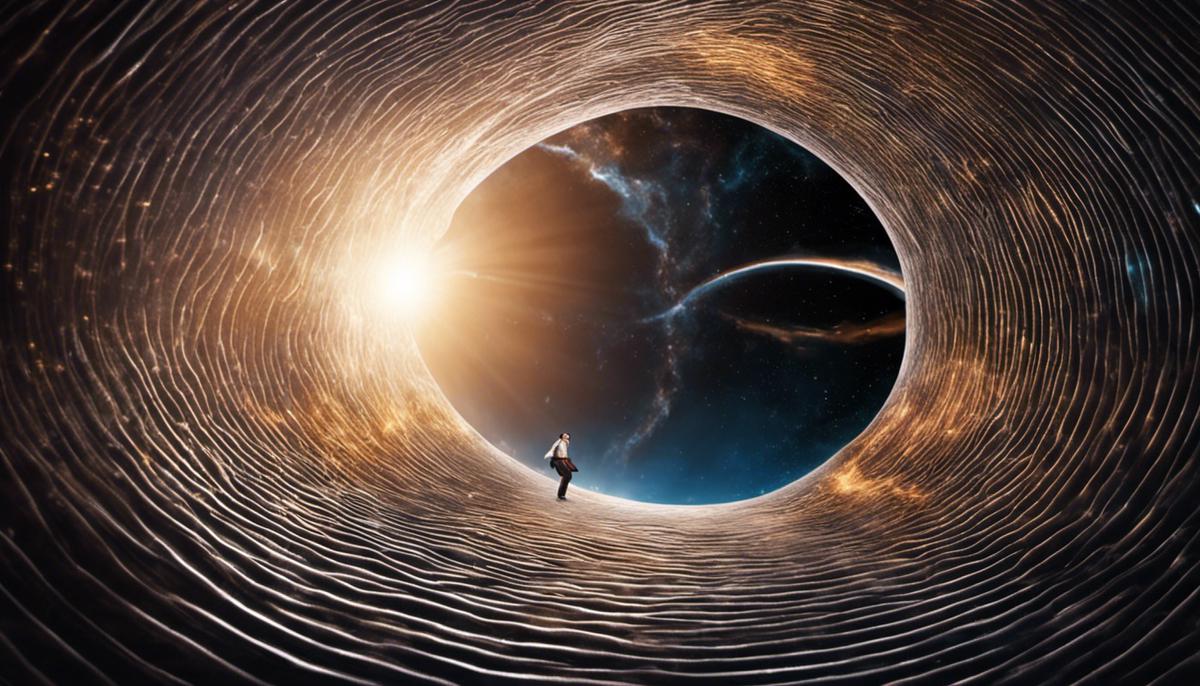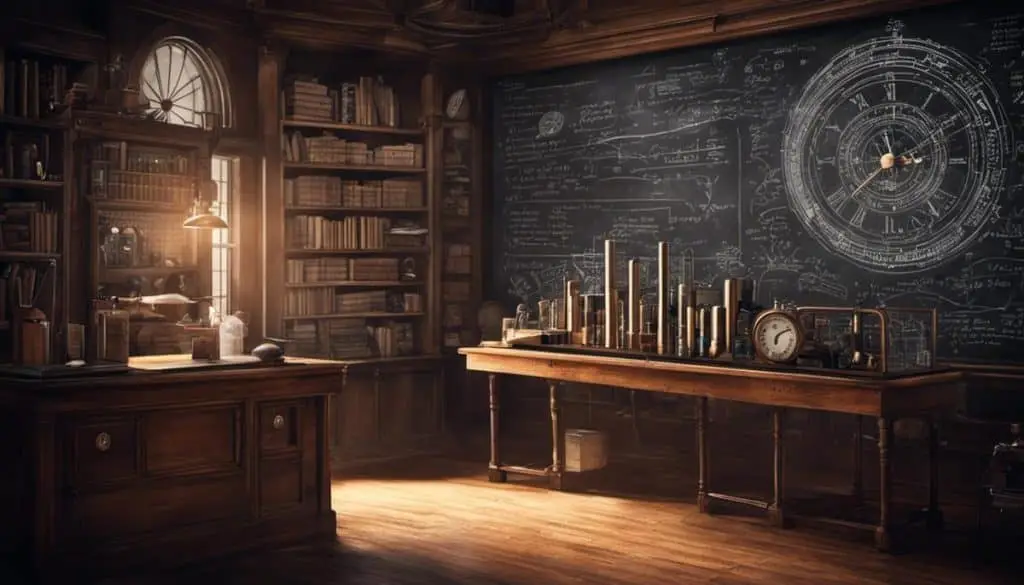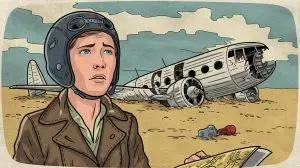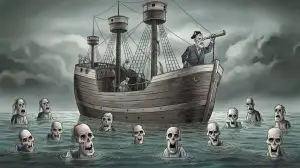Across the diverse canvas of human understanding and curiosity, few subjects have engaged our collective imagination quite as deeply as the concept of time travel. This mysterious encounter with the fabric of space-time, tucked away in the seams of quantum mechanics, relativity theories, and the enigma of wormholes, proposes tantalizing prospects and paradoxes. The unfathomable question of meddling with the course of events, stepping across the bounds of present into the past or future, brings a thrilling new dimension to our notions of reality. As we journey through this exploration, we will touch base with certainly complex but undeniably intriguing scientific theories, paradoxes and their impacts, temporal tourism, and potential technological innovations for time travel.
Theoretical Framework for Time Travel
The Science of Time Travel: Current Theories Explored
Abstract:
The concept of time travel has always been a captivating proposition, not only for science fiction enthusiasts but also for scientific communities. The potential to traverse different points in temporal space is an enticing thought and a relentless pursuit for certain members of the academic sphere. This article elucidates the complex theories currently prevalent in trying to explain this intriguing concept.
(Main Body)
Physicists often grapple with the foundations of space and time. Concepts like entropy, relativity, and quantum mechanics have all played pivotal roles in our quest to understand the possibility of time travel. The theoretical explanations for time travel can be primarily categorized into two spheres – Einstein’s General Relativity and Quantum Mechanics.
Einstein’s general theory of relativity has provided a scientific premise for time travel. It postulates that space and time are woven into a single, four-dimensional construct known as spacetime which is curved and twisted by mass and energy. Under certain conditions, this curvature can form “wormholes”, bridges through spacetime, theoretically allowing the instantaneous movement between vast interstellar distances, and possibly even different points in time. But, it’s essential to perceive the caveats: wormholes, while mathematically plausible, merely exist hypothetically and are prone to instability. Implementing them for practical time travel features challenges that extend beyond our current understanding in physics.
Parallel to the theory of relativity, Quantum Mechanics may grant a glimpse of understanding into the temporal maze. Quantum Mechanics insists that the minuscule particles in our universe can exist in multiple states at once, a phenomenon termed as superposition. Applying this principle to the whole universe, the concept of “many-worlds interpretation” emerges. It suggests that each decision creates a split in the universe, where each conceivable outcome occurs in separate, parallel worlds. So technically, it’s not time travel per se, however, visiting an alternate universe could be tantamount to visiting a different point in time.
In addition, experiments with quantum teleportation and quantum entanglement reflect the possibility that information could potentially “travel” faster than the speed of light – a key consideration in theoretical time travel. However, it’s important to underscore that these phenomena are incredibly complex and their relationship with time travel remains highly hypothetical and widely disputed.
Time dilation, another essential concept under general relativity, has been practically validated. Satellites orbiting Earth provide empirical evidence since correction for time dilation is fundamentally ingrained in the operational mechanism of GPS systems. Herein time slows down for objects traveling at high speeds or in strong gravitational fields. However, for practical application as time travel, this would require speeds or gravitational fields which are currently unattainable.
On the whole, the concept of time travel leads us to many exciting possibilities, but it still exists on the periphery of practical and theoretical physics. The scientific desire to unlock these secrets continues unabated, uniting the intellectual brilliance of mathematicians, physicists, and philosophers alike. It is fascinating, however, that concepts once dwelling purely in the realm of science fiction now figure prominently in academic discourse. This persistent pursuit of the intriguing unknown indeed reflects the relentless quest of scientific inquiry.

Impacts of Paradoxes
Delving deeper into the intricacies of time travel, a key consideration that significantly interferes with our understanding is the potential emergence of paradoxes – inconsistencies that could upheave our comprehension of reality and threaten the continuity of events. To ground our discussion, we will focus on two predominant paradoxes widely discussed in the scientific community – the ‘Grandfather Paradox’ and the ‘Bootstrap Paradox’.
Often used as a litmus test in arguments against the feasibility of time travel, the Grandfather Paradox is an anomaly that arises when one contemplates traveling back in time and purposely, or inadvertently, altering the course of history. To present a succinct scenario – imagine a time traveler traveling back in time and eliminating their own grandfather before their parent has been conceived. This disruptive action consequently wipes out the time traveler’s own existence which raises the question – who, then, eliminated the grandfather? This creates a logical impossibility, a causal loop without a point of origin, thus establishing it as a paradox.
In the realm of relativity, the prospect of resolving the Grandfather Paradox often involves the possessor of free will surrendering their ability to effect changes, captured eloquently in the Novikov Self-Consistency Principle. This hypothesis suggests that any action taken by a time traveler would inevitably be a part of history, and any attempt to deviate would be intrinsically thwarted – maintaining the uniformity of the space-time continuum.
On the other hand, Quantum Mechanics proffers an alternative resolution, postulating the initiation of a new, parallel universe every time an individual alters a course of events within a timeline – an extension of the many-worlds interpretation. Despite its harmonic allusion, the feasibility of such a concept remains largely theoretical.
The Bootstrap Paradox, or causal loop, on the other hand, posits an object or piece of information sent back in time becomes trapped within an infinite cause-effect loop, where the origin of the object or information cannot be defined. In essence, this paradox illustrates a self-fulfilling prophecy, where the cause-effect relationship is circular rather than linear, eluding any logical origin or endpoint.
Untangling these paradoxes and harmonizing them within our known laws of physics poses substantial challenges. Issues from free will to quantum inequality stand as towering roadblocks. Yet, the possibility of time travel, and the doubts it arouses in our understanding of causality and reality, remain enduring fascinations for scientists.
In essence, while we strive to decipher and comprehend these complex inconsistencies, it is essential to approach these scientific puzzles with a degree of humility, ready to accept our current limitations and unknowns. As our knowledge advances, perhaps we will begin to unravel these temporal tangles, and in doing so, not only redefine the possibilities of time travel, but also reshape our perception of reality and our role in the universe. Even with our current restrictions, humanity’s bold venture in the quest for knowledge persists, pushing against boundaries and ever urging us to question the fabric of our cosmos.

Temporal Tourism
Diving deeper into this fathomless domain of paradoxical possibilities, time travel teases our curiosity with intriguing enigmas. A significant quandary looming over this theoretical domain is the conundrum known as the Grandfather Paradox. It posits an uncomfortable situation: What would happen if a time traveler went back and eliminated their grandfather before their parent was conceived—would they subsequently cease to exist?
Attempting to resolve this paradox, one encounters the astutely formulated Novikov Self-Consistency Principle. The principle proposes that it is impossible for time travel to change the past in any way, as any actions taken by a time traveler were already part of history, and thus, the apparently paradoxical event would still lead to a self-consistent solution.
In this light, the resolution of the Grandfather Paradox through the lens of General Relativity becomes plausible. What is past was unalterably so, and actions of a time traveler were always part of the timeline.
Quantum Mechanics, on the other hand, unveils a different resolution to the paradox. Proponents of the many-worlds interpretation argue that the alteration in the past timeline by the time traveler would lead to a formation of an entirely novel universe, branched off from ours.
The concept of the Bootstrap Paradox deserves attention in this discourse, representing a scenario where an event or object is uncaused—its existence forms a time loop that lacks a discernible origin. These causal loops, where cause and effect run in a never-ending cycle, further complicate the understanding of time travel, adding another layer to an already complex tapestry.
Then comes the freedom of choice or free will in the context of time travel. Say a time traveler learns of future events, could they change their actions to alter the predicted outcome? This question highlights an innate dilemma—the clash between determinism and free will, simmering at the edge of theoretical physics and philosophical scrutiny.
One can’t overlook the principle of ‘quantum inequality’, which postulates limits on negative energy, a critical component for stabilizing wormholes, thus having significant implications on the practical feasibility of time travel.
Despite these insurmountable challenges and puzzling paradoxes, the scientific community continues to delve into time travel; bolstered by an insatiable curiosity and an enduring fascination to understand the complex intricacies of time.
Ultimately, the key lies in embracing humility and acknowledging our limitations in comprehending the mysteries of time and the universe. Time travel—what once seemed a flight of fancy—embracing it, has the potential to redefine our understanding of reality, establishing a profound narrative of the human role within the cosmic order. The pursuit of such knowledge ultimately shapes humanity’s interaction with both past and future events. This endeavor, trudging along paths less traveled, exploring the highly theoretical and enigmatic depths of time travel, might hold the key to unlocking new dimensions of human wisdom.

Technological Innovations for Time Travel
Stepping into the domain of current and future technological advancements, two innovations earmark themselves as valuable contributors in the quest for time travel: Antimatter propulsion and Digital Immortality through AI.
Antimatter propulsion, a sizeable leap from conventional rocketry, involves utilizing the power resultant from the annihilation on the interface of matter and antimatter. The resulting energy surge vastly outstrips fossil fuel combustion and even nuclear fission or fusion, according to Einstein’s equation, E=mc². Theoretically, if we could devise an effective containment system to harness antimatter’s colossal energy, we could propel spacecraft at speeds nearing light, invoking relativistic time dilation, allowing occupants to experience time more slowly than those left behind on Earth.
While we are yet to perfect an antimatter containment technique, certain organizations like CERN are tirelessly extracting and storing minuscule antimatter amounts. This is the testament to humanity’s enduring obsession with unraveling the great mysteries of the universe and our ever-vigorous attempts to inch closer to the hitherto realm of science fiction.
Digital Immortality, on the other hand, swims against the tide. Instead of physically traversing the temporal dimension, it proposes recording human consciousness into a digital format. Through powerful AI and complex algorithms, we could potentially create simulations to project consciousness into imagined pasts and forecasted futures. Although currently, the computational power and understanding required for such a feat are enormous, advancements in quantum computing and cognitive science may edge us closer to achieving this seemingly fantastical endeavor.
However, core philosophical and ethical questions accompany this proposition. If successful, does this artificial consciousness genuinely represent the original, or is it a new entity altogether? How closely would the simulated timeframes adhere to actual historical or future events?
Venturing into the future, we anticipate contending with even more paradoxes and confronting enigmatic scientific challenges. Time travel’s thrilling pursuit dangles the allure of understanding better the grand cosmic dance and our role within it, and perhaps even redefining our comprehension of reality. It invites us to dream, to push the boundary between the impossible and the possible.
In conclusion, despite time travel’s significant complications, its study remains a fascinating collaboration of imagination, technological innovation, and grueling scientific endeavor. The relentless charm of traversing the immutable arrow of time will doubtlessly drive humanity’s quest for knowledge and innovation further, perpetually hurtling us toward the realization of the inconceivable.

Moving beyond the confines of theoretical science, we witness a shift toward redefining possible technological advancements that can enable time travel. From bending space-time with artificial wormholes to capturing the vast potential of quantum computing and harnessing the power of elusive dark energy, the future of time travel technology paints an intriguing framework for us to ponder upon. The specter of modifying history or anticipating the future, whilst opening a Pandora’s Box of ethical and societal debates, allows humanity to dream, explore, and perhaps one day pierce the illusion of time’s arrow. As we tread on this journey of understanding and possibly uncovering the secrets of time travel, we open doors to a realm of alternative realities and unchartered territories of knowledge.






